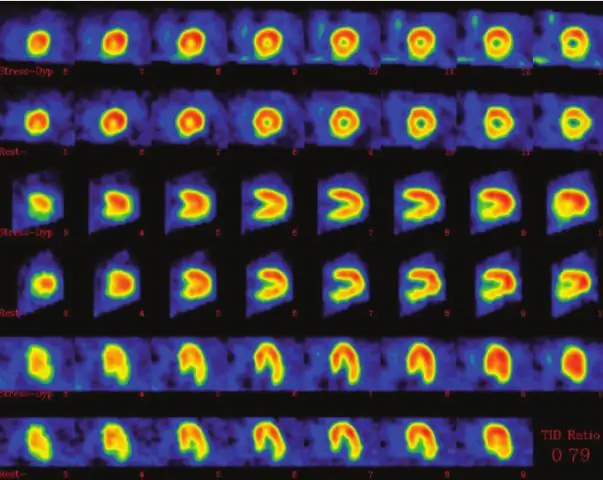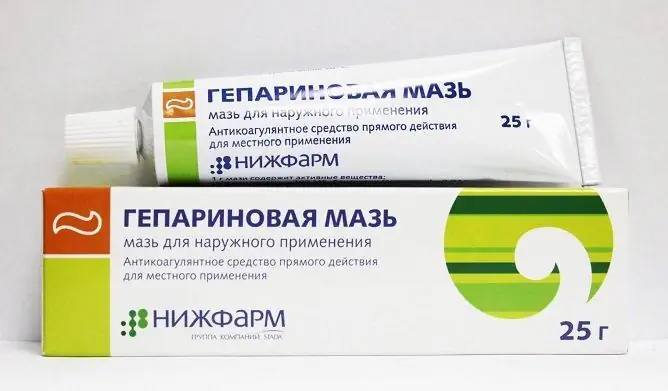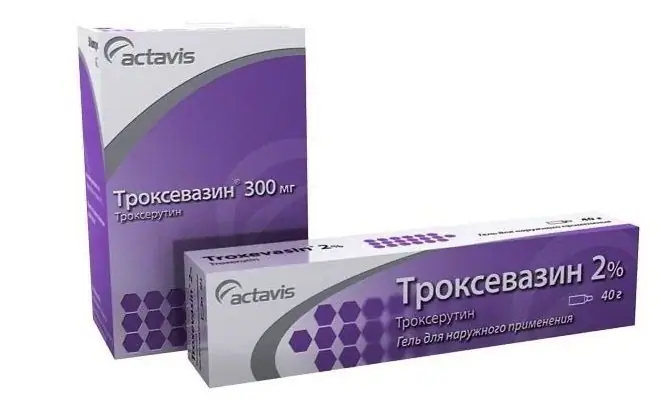- Author Rachel Wainwright wainwright@abchealthonline.com.
- Public 2023-12-15 07:39.
- Last modified 2025-11-02 20:14.
Dipyridamole
Dipyridamole: instructions for use and reviews
- 1. Release form and composition
- 2. Pharmacological properties
- 3. Indications for use
- 4. Contraindications
- 5. Method of application and dosage
- 6. Side effects
- 7. Overdose
- 8. Special instructions
- 9. Application during pregnancy and lactation
- 10. Use in childhood
- 11. In case of impaired renal function
- 12. For violations of liver function
- 13. Use in the elderly
- 14. Drug interactions
- 15. Analogs
- 16. Terms and conditions of storage
- 17. Terms of dispensing from pharmacies
- 18. Reviews
- 19. Price in pharmacies
Latin name: Dipiridamol
ATX code: B01AC07
Active ingredient: dipyridamole (dipyridamole)
Manufacturer: tablets - LLC Ozon (Russia), JSC Pharmaceutical Enterprise Obolenskoe (Russia), JSC VERTEX (Russia); suspension - Rosemont Pharmaceuticals Ltd (UK)
Description and photo update: 2019-18-09
Prices in pharmacies: from 279 rubles.
Buy

Dipyridamole is a vasodilating drug.
Release form and composition
Dosage forms:
- Coated tablets (10 pcs. In a blister strip, in a cardboard box: 25 and 50 mg - 5 or 10 packs, 75 mg - 4 or 10 packs);
- Suspension for oral administration: bright yellow liquid with a characteristic smell of almonds (150 ml each in orange glass bottles (type III), 1 bottle in a cardboard box).
The active substance is dipyridamole:
- 1 tablet - 25, 50 or 75 mg;
- 5 ml of suspension - 50 mg.
Suspension excipients: ammonium glycyrrhizinate, aluminum magnesium silicate, propylene glycol (E1520), polysorbate 80, liquid maltitol (E965), sodium hydrogen phosphate anhydrous (E339), citric acid monohydrate solution 5%, simethicone emulsion 30% (Q7-2587), methyl parahydroxybenzoate (E218), sodium hydrogen phosphate anhydrous solution 5%, propyl parahydroxybenzoate (E216), xanthan gum (E415), almond flavor (F31209) (contains propylene glycol and ethanol), citric acid monohydrate (E330),
Pharmacological properties
Pharmacodynamics
Dipyridamole improves microcirculation, inhibits platelet aggregation and adhesion, and has a mild vasodilator effect.
The mechanism of the inhibitory effect of dipyridamole on platelet aggregation is associated with the suppression of the reuptake of adenosine (an inhibitor of platelet reactivity) by erythrocytes, platelets and endothelial cells, as well as with inhibition of platelet phosphodiesterases and activation of adenylate cyclase. Thus, the drug prevents the release of aggregation activators from platelets, including serotonin, adenosine diphosphate (ADP), thromboxane (TxA 2). Dipyridamole increases the synthesis of prostacyclin PgI 2 by the endothelium of the vascular wall. Preventing platelet aggregation, normalizes the ratio of PgI 2 and TxA 2… Enhances the synthesis of endothelial nitric oxide (NO). Reduces the adhesion of platelets, stabilizes blood flow in the ischemic focus, prevents the formation of blood clots in the vessels.
Dipyridamole has a dose-dependent ability to lengthen the pathologically shortened platelet lifespan.
Due to the vasodilating effect, the drug reduces the total and peripheral vascular resistance, improves microcirculation, and has angioprotective properties. These effects are attributed to an increase in the activity of endogenous adenosine, which affects vascular smooth muscle and prevents the release of norepinephrine.
Dipyridamole has angiogenic and arteriogenic activity, stimulates the formation of new capillaries and collateral arteries.
The drug normalizes venous outflow, reduces the incidence of deep vein thrombosis after surgery. Improves microcirculation in the renal glomeruli and retina.
Such effects of dipyridamole, as improving cerebral circulation and decreasing the tone of cerebral vessels, are used in neurological practice. In the course of angiographic studies, it was found that the use of the combination "dipyridamole + acetylsalicylic acid" can slow down the progression of atherosclerosis.
In obstetric practice, the drug is used to improve placental blood flow, eliminate fetal tissue hypoxia and the accumulation of glycogen in them, and prevent dystrophic changes in the placenta.
Pharmacokinetics
After oral administration, dipyridamole is rapidly absorbed from the gastrointestinal tract: mainly in the stomach, to a lesser extent in the small intestine. The bioavailability of the drug varies from 37 to 66%.
The maximum plasma concentration of dip0-iridamole reaches within 2 hours. It binds almost completely to plasma proteins (80-95%). It is metabolized in the liver by binding to glucuronic acid. It is excreted mainly in bile, excreted through the intestine in the form of monoglucuronide. A small amount (1-3%) is excreted by the kidneys.
The decrease in the plasma concentration of the drug is biphasic. The half-life of dipyridamole in the initial phase is 20-30 minutes, the final phase of elimination is 10-12 hours.
Indications for use
- Prevention and treatment of cerebral circulation disorders of the ischemic type;
- Encephalopathy;
- Prevention of venous and arterial thrombosis and their complications;
- Prevention of thromboembolism after heart valve replacement surgery;
- As part of a comprehensive treatment of all types of microcirculation disorders;
- Prevention and treatment of acute respiratory viral infections (ARVI), influenza, as an immunomodulator and interferon inducer (only tablets).
In addition, Dipyridamole tablets are used in complicated pregnancies to prevent placental insufficiency.
Contraindications
- subaortic stenosis;
- common stenosing atherosclerosis of the coronary arteries;
- unstable angina;
- hypertrophic obstructive cardiomyopathy;
- severe heart rhythm disturbances;
- decompensated heart failure;
- severe arterial hypotension;
- severe arterial hypertension;
- collapse;
- acute myocardial infarction;
- hepatic / renal failure;
- hemorrhagic diathesis;
- diseases with a tendency to bleeding (for example, peptic ulcer of the stomach or duodenum);
- chronic obstructive pulmonary disease;
- hypersensitivity to any component of the drug.
Additional contraindications to the use of tablets are:
- lactose intolerance, glucose-galactose malabsorption syndrome, lactase deficiency;
- children under 12 years of age.
Additional contraindications to the use of the suspension are:
- intolerance to fructose;
- age up to 18 years.
According to the instructions, Dipyridamole should be used with caution in the following cases:
- blood clotting disorders;
- elderly age;
- the period of pregnancy and lactation.
Instructions for the use of Dipyridamole: method and dosage
Film-coated tablets
In tablet form, Dipyridamole should be taken orally on an empty stomach, swallowing whole and drinking plenty of water.
The optimal dosage regimen and the duration of treatment are selected by the doctor individually, depending on the indications, the severity of the disease and the patient's response to therapy.
Individual cases of drug dosing:
- prevention and treatment of cerebrovascular accidents: 75 mg 3 to 6 times a day (daily dose is 225-450 mg);
- ischemic heart disease: 75 mg 3 times a day, if necessary, increase the dose, treatment is accompanied by careful medical supervision;
- reduction of platelet aggregation: the daily dose can vary in the range of 75-225 mg, in severe cases, it is possible to increase the daily dose to the maximum allowable - 600 mg;
- prevention of placental insufficiency: 25 or 75 mg 3 times a day. The maximum permissible daily dose of Dipyridamole during pregnancy is 225 mg;
- prevention of influenza and ARVI: 50 mg 1 time in 7 days for 4-5 weeks (during the epidemic);
- prevention of recurrence of acute respiratory viral infections in frequently ill patients: 50 mg 2 times a day with a 2-hour interval, once a week for 8-10 weeks.
The duration of taking the drug is individual. Dipyridamole can be used for a long time.
Oral suspension
The suspension is taken orally 1 hour before meals. It is recommended to shake the contents of the bottle before each use.
Dosing is prescribed by the attending physician individually, depending on the clinical indications, the severity of the patient's condition and his response to treatment. Recommended daily dosage:
- decrease in platelet aggregation: 100 mg (2 teaspoons) 3 times a day, for severe cases, an increase in the daily dose to 600 mg is allowed;
- prevention of influenza and other acute respiratory viral infections (most relevant in the epidemiological period): 50 mg (1 teaspoon) once a week, course duration - 4-5 weeks;
- prevention of relapse in patients who often suffer from viral respiratory infections: 100 mg (2 teaspoons) 2 times a day 1 time a week, duration - 8-10 weeks.
Side effects
When taken in therapeutic doses, Dipyridamole is generally well tolerated. The resulting side effects are usually mild and temporary.
Classification of adverse events by the frequency of their development: often - from> 1/100 to 1/1000 to 1/10 000 to <1/1000, very rarely - <1/10 000 (including individual messages), unspecified frequency - set the frequency to based on the available data is not possible.
Possible side effects:
- on the part of the blood and homeostatic system: infrequently - changes in the functional properties of platelets, thrombocytopenia; rarely - bleeding; very rarely - increased bleeding during or after surgery;
- from the digestive system: infrequently - pain in the epigastric region, diarrhea, nausea, vomiting (these phenomena usually disappear on their own with continued treatment);
- from the liver and biliary tract: unspecified frequency - inclusion of dipyridamole in gallstones;
- on the part of the cardiovascular system: infrequently - flushing of the face, palpitations, bradycardia, tachycardia, lowering blood pressure, coronary steal syndrome (when taking dipyridamole in daily doses of more than 225 mg); very rarely - increased symptoms of ischemic heart disease (angina pectoris, myocardial infarction);
- from the immune system: rarely - allergic reactions (urticaria, skin rash, angioedema, severe bronchospasm);
- Others: headache, dizziness, weakness, facial flushing, tinnitus, ear congestion, rhinitis, arthritis, myalgia.
Overdose
In case of an overdose of dipyridamole, the following symptoms usually occur: flushing of the face, a feeling of fever, increased sweating, dizziness, weakness, anxiety, a marked decrease in blood pressure, tachycardia, the development or exacerbation of angina attacks.
It is recommended to induce vomiting, flush the stomach and take an adsorbent (for example, activated carbon) to reduce the absorption of the drug from the gastrointestinal tract. The vasodilating effect of the drug is stopped by slow intravenous administration of aminophylline (50-100 mg / min). For angina pectoris, sublingual nitroglycerin is prescribed.
special instructions
Intravenous administration of dipyridamole is not recommended, since there is a risk of stealing syndrome with aggravated signs of angina pectoris.
In the complex therapy of patients with severe myasthenia gravis, it is necessary to adjust the doses of drugs while taking dipyridamole.
With constant intake of the drug inside, additional intravenous administration of dipyridamole should not be prescribed.
If it is necessary to carry out a load test to diagnose coronary artery disease, taking the drug inside should be canceled 24 hours before its intravenous administration.
Influence on the ability to drive vehicles and complex mechanisms
The drug can cause side effects in the form of weakness, dizziness and a decrease in blood pressure, therefore, during the period of treatment, patients must be careful in all activities that require a high speed of psychomotor reactions, concentration of attention, including when driving.
Application during pregnancy and lactation
During pregnancy, Dipyridamole is used for absolute indications. The dosage and duration of treatment are determined by the doctor for each patient individually.
The drug passes into breast milk, therefore, during lactation, it can be prescribed only after a careful assessment of the ratio of the expected benefits and possible risks.
Pediatric use
Dipyridamole tablets are contraindicated in children under 12 years old, suspension - up to 18 years old.
With impaired renal function
The use of Dipyridamole is contraindicated in case of decompensated renal failure.
For violations of liver function
The use of Dipyridamole is contraindicated in the presence of liver failure.
Use in the elderly
Due to the likelihood of orthostatic hypotension, Dipyridamole should be used with caution in the elderly.
Drug interactions
- adenosine: its concentration in blood plasma increases, cardiovascular effects are enhanced (dose adjustment is required);
- acetylsalicylic acid: the effects of both drugs are summed up;
- antacids: the absorption of dipyridamole decreases and, as a result, its effectiveness;
- anticoagulants and acetylsalicylic acid: their effect may be enhanced (when adding dipyridamole to warfarin, there is no increase in the frequency and severity of bleeding compared with taking only warfarin; while taking acetylsalicylic acid, the frequency of bleeding does not increase);
- antihypertensive drugs: their effect is enhanced;
- cholinesterase inhibitors: their effect is weakened, due to which the course of myasthenia gravis can be aggravated;
- xanthine derivatives (theophylline, caffeine): a decrease in the vasodilating effect of dipyridamole is possible;
- antibiotics of the cephalosporin series (cefoperazone, cefamandol, cefotetan): the antiplatelet effect of dipyridamole is enhanced.
Analogs
Analogues of Dipyridamole are: Antistenocardin, Dipyridamole-FPO, Dipyridamole-Ferein, Curantil, Padikor, Persantin, Parsedil, Stenocardil, Trancocord.
Terms and conditions of storage
Store at temperatures up to 25 ° C, tablets in a dry place. Keep out of the reach of children.
Shelf life: tablets - 5 years, suspension - 2 years.
Terms of dispensing from pharmacies
Dispensed by prescription.
Reviews of Dipyridamole
The drug is used mainly for prophylactic purposes or as part of a combination therapy, which makes it difficult to assess its effectiveness, therefore there are very few reviews of Dipyridamole.
Pregnant women who received the drug for the prevention and complex treatment of fetoplacental insufficiency and premature aging of the placenta noted good tolerance to dipyridamole, only some women experienced dizziness, and blood pressure decreased slightly.
There are positive reviews about Dipyridamole as a means of preventing influenza and ARVI. Patients write that thanks to this drug, they have become much less likely to get colds and viral diseases. Its additional advantage is the convenience of reception (once a week).
Studies investigating the effect of dipyridamole in coronary heart disease, thrombosis and venous thromboembolism confirm the effectiveness of the drug in the prevention of these diseases.
Price for Dipyridamole in pharmacies
Approximate prices of Dipyridamole: 25 mg tablets - 320-335 rubles. per pack of 100 pcs., 457 rubles. per pack of 120 pcs., 75 mg tablets - 394-437 rubles. per pack of 40 pcs. The cost of the 50 mg tablets and oral suspension is currently unknown.
Dipyridamole: prices in online pharmacies
|
Drug name Price Pharmacy |
|
Dipyridamole 75 mg film-coated tablets 40 pcs. 279 r Buy |
|
Dipyridamole 25 mg film-coated tablets 100 pcs. 297 r Buy |
|
Dipyridamole 75 mg film-coated tablets 40 pcs. 304 RUB Buy |
|
Dipyridamole 75 mg film-coated tablets 40 pcs. 339 r Buy |
|
Dipyridamole tablets p.o. 25mg 100 pcs. 375 RUB Buy |
|
Dipyridamole 25 mg film-coated tablets 100 pcs. 403 RUB Buy |
|
Dipyridamole 25 mg film-coated tablets 120 pcs. 429 r Buy |
|
Dipyridamole tablets p.o. 75mg 40 Pcs. 457 r Buy |
|
Dipyridamole tablets p.o. 25mg 120 pcs. 461 r Buy |
|
Dipyridamole tablets p.o. 75mg 40 Pcs. 493 r Buy |
| See all offers from pharmacies |

Maria Kulkes Medical journalist About the author
Education: First Moscow State Medical University named after I. M. Sechenov, specialty "General Medicine".
Information about the drug is generalized, provided for informational purposes only and does not replace the official instructions. Self-medication is hazardous to health!






